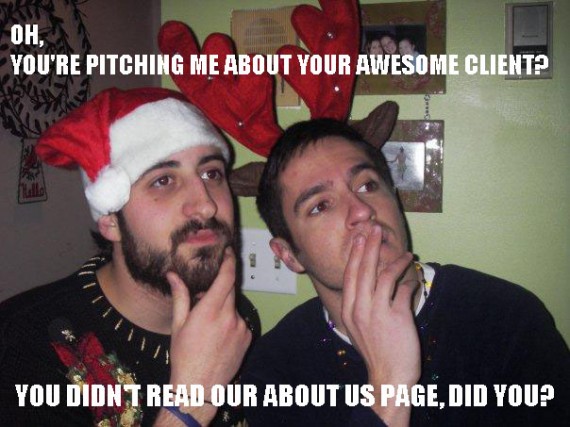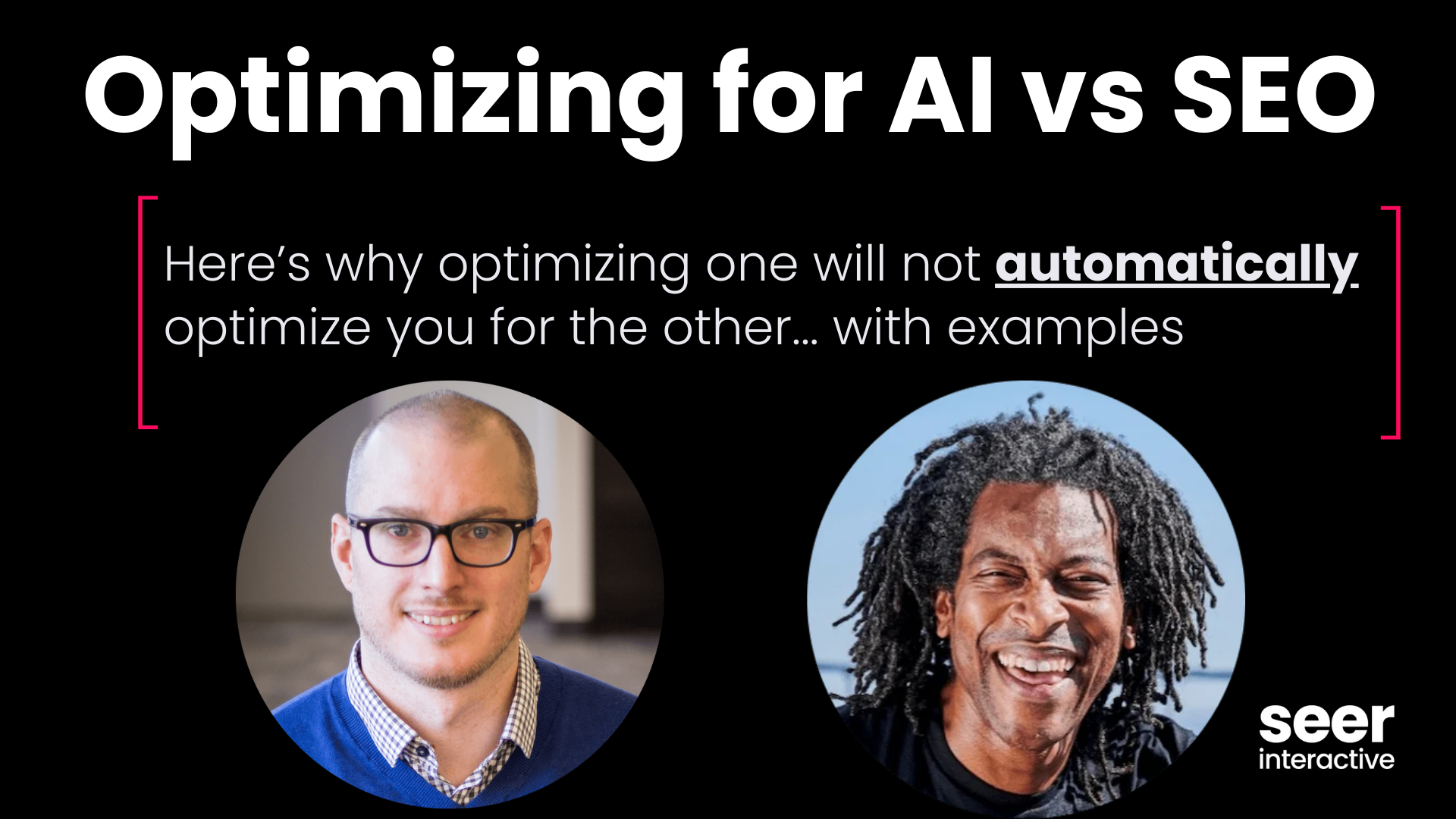We've done a ton of outreach for SEO clients over the past decade. Some of the bigger SEO outreach wins have come from what we've NOT done. From NOT contacting a site that was cursing at our client in a post to NOT contacting people currently in lawsuits with clients, below are some link outreach strategies & tips that have helped save our butts.
1. Read The About Me Page
Solution: It sounds so simple but it's so often missed. Go click on the About section.
Real Client Example: This really applies to all clients. Some bloggers need to be pitched the right way. Some will even tell you the best way to pitch them. Saves you time & raises your link acquisition percentage.
With a few queries, I was able to come across sites that say Hey PR Folks, Here's How To Pitch Me or How To Pitch Me or even better, Should You Pitch Me On Your Latest Infographic.
In the perfect storm, an already unreasonable site owner on a really bad day could receive your really off topic infographic and suddenly they're your worst enemy.
2. Find Out If The Site Covered You Already
Solution: An easy way to do this is through a quick site:thatwebsite.com "your client".
Real Client Example: I found a site that was extremely relevant for Client Z. They were very open to multiple types of partnerships through what I was seeing on their site. I ran this quick query to see if they covered Client Z and they had about 2 years ago. By talked, I mean that they had an issue with a product Z offered and literally said "&*%$ that company". This suddenly isn't a great fit anymore.
If they still had the same sentiment 2 years later, our outreach could quickly turn into negative postings to their 10,000 twitter followers.
3. Search The Client Name & Lawsuit
Solution: "client name" lawsuit
Real Client Example: When doing outreach, you'll want to know who is currently suing your client or is taking them to court. Adding fuel to the fire of a legal battle is the last thing you want to do, but an off topic email to the wrong person at the right time could do that.
We did this prior to outreach for a client and found someone suing them over questionable image rights usage. Noted. When we heard they were going to use images of this person in an upcoming post, we said they might want to find someone else. Helped SEER look knowledgeable & helped them to not fan that flame.
4. Stop Asking To Buy A Link
Solution: Ask to have a partnership, relationship, sponsor, advertise, anything but "How much does a link cost".
Real Industry Example: Everyone remembers the pitch to Avinash and other more recent pitches gone wrong. Sometimes it's a new intern trying to be a bull, other times it's laziness. After penguin, this is probably the easiest way to get outed & lose credibility.
Deep down, we all need links & usually we need them yesterday. Go about it the right way. Offer some type of relationship with the website if possible. Some of the more successful links started by asking the blogger/site how they would like to partner with a client. Building a relationship that's valuable for their audience, independent of a nofollow tag on a link, could mean the difference between creating a brand advocate or an unanswered email.
5. Don't Offer What Isn't Being Offered
Solution: If you're pitching a contest, see if the site has ever done contests. If you're pitching a review, see if the site has ever done reviews. If you're looking to pitch a giveaway, see if the site has ever done giveaways. Again, a short site:thatwebsite.com contest OR giveaway OR review works just fine.
Real Client Example: This happened to me early in my career at SEER. I contacted a site asking if they wanted to do a review & got a not so flattering email back saying that if I had checked their site, they do not do reviews. It's in their About page (womp womp). The site owner then was nice & saw it as an advertising opportunity & offered that option. It was a quick lesson learned.
6. Don't Offer What Isn't A Match
Solution: Look through the last dozen posts as well as categories in the nav. This can quickly tell you if your pitch is going to be relevant to their audience.
Real Industry Example: Snowboarding sites usually do not want to hear pitches about anything to do with skis. Offroading dirt biker sites have very little interest in hearing about a saddlebag for a Harley. Some mommy bloggers are ok talking about Adult topics, others are very much keeping it PG. Knowing who is related to the industry you're in and is NOT a fit can be huge in saving face when talking to a client & when researching linking opportunities.
7. Don't Make It All About You
Solution: Ask three questions: How does the pitch help the site owner personally? How does it further their reach? How is it beneficial for their audience? If you can't come up with an answer for any of these, you're probably wasting time.
Real Industry Example: You can burn bridges with site owners & bloggers by peppering them with items for you you you but not thinking about compensation for them. After this is done once or twice, you become spam to that owner.
8. Stop Sweating The Linking Specifics
Solution: Do nothing. Easiest solution so far.
Real Industry Example: When you ask a site to remove a nofollow or add several more anchor text rich links, that could be perceived as weird. You could lose the partnership OR have that site post on their blog/twitter/facebook that you're giving them a hard time about links. Now everyone knows you're trying to game Google & take advantage of a site owner. Avoid it by not sweating smaller percentages of sites that include the nofollow or aren't linking exactly how you want. If anything, it helps randomize your backlink profile, something that helps it stay/look more naturally.
9. Scroll Through Their Last Few Posts
Solution: Mouse scrolling. Second easiest solution to doing nothing.
Real Industry Explanation: It's all about having relationships with sites & doing real company things. If your client has extra inventory they can give away & you pitch that to a site that JUST had a giveaway for a similar item, it's going to seem like you never invested time researching before pitching. A simple "I know you just reviewed/did a giveaway, are you interested in doing one again in the future" could help save that opportunity.
10. Send Something No String Attached
Solution: Give your target something you know is valuable for them.
Real Industry Explanation: My guard is removed when I receive something of value with no strings attached. At that point, I might be dealing with a hustler, but I don't feel like I'm being hustled.
One of the greatest link outreach return on investments I've seen was by fulfilling a wishlist item for a blogger, no strings attached, that cost the client $20. This turned that blogger into a brand advocate because of strategically simple, but a great outreach message with no pitch.
Overall, I think common sense prevails in a lot of these situations. Be a real person. Don't be weird. Research a little before contacting. Follow me on twitter (@adammelson) for other outreach, linking & other SEO topics.
If you found this post useful, put these outreach tips to good use & read up on how to reclaim referral traffic & conversions.



